Drawing from the momentum of Venture Taranaki the Enviroschools Taranaki team were able to support the continuation of a community approach to learning and actions that embraced community needs, benefited people and benefited the environment through 2020.
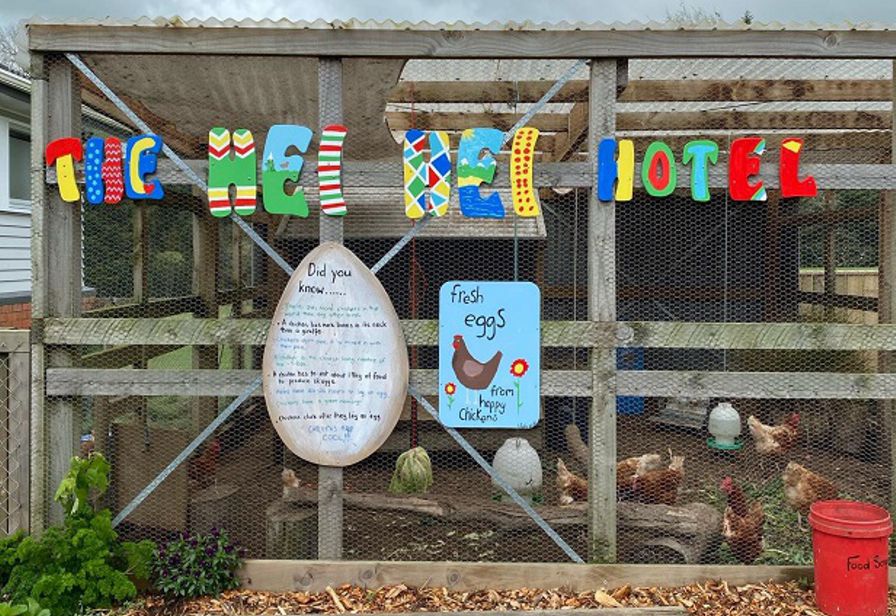
Stratford hen house.
Taranaki Regional Council delivers the Enviroschools programme in the region, alongside partners Toimata Foundation, Kindergarten Taranaki, TSB Community Trust, South Taranaki District Council, New Plymouth District Council and Stratford District Council.
Enviroschools Taranaki supported five key projects over the year, responding to the varying needs and interests of Enviroschools around the rohe.
Sustainable Backyard Trail
Five Enviroschools were involved in the Taranaki Sustainable Backyard Trail, a region-wide offering of some of the most inspiring backyards in Taranaki! From solar panels to bio-intensive veggie gardens, the Trail offered a wide range of examples of what everyday people can to do to live a more sustainable life and included Toko School, Stratford Primary School, Ratapiko School, Waitoriki School and Waitara High School.
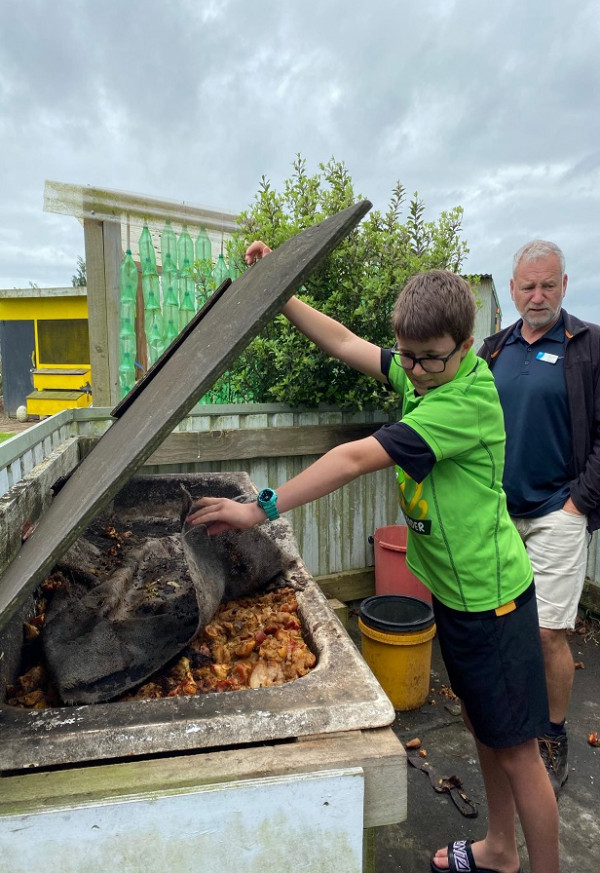
Worm farm at Toko School
Involvement was supported by each school’s staff, community and whānau. Additional support was given by Enviroschools Facilitators and the results were fabulous. The tamariki were empowered to run tours, grow, harvest, create and make their items to sell as well as run project-based talks on chosen areas of learning.
Over 10 days, including some weekend time, these schools were open to the public – which also coincided with the Taranaki Garden Festival, the Taranaki Arts Festival and the Opunake Yarn Bombing.
Visitors came to the region from far and wide and many enjoyed theses school tours. The Enviroschools team and TRC’s Comms Advisor Holly went on a tiki-tour to see all the schools and loved it!
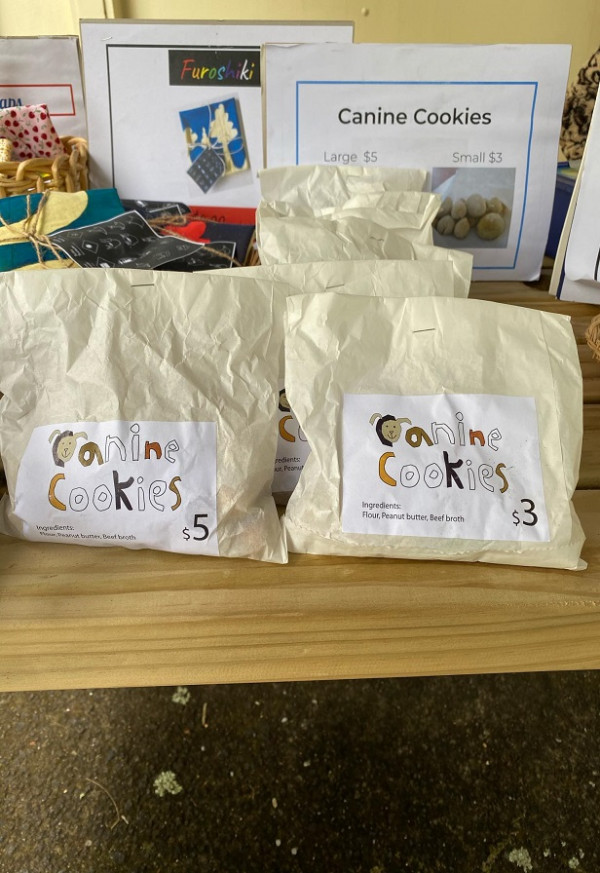
Canine cookies at Waitokiri
Weaving workshops
As part of the Plastic Free July preparation in 2020, Enviroschools Taranaki ran a series of weaving workshops within schools and for teachers and school/kindergarten staff outside of school hours. The background of these workshops was to support people's learning and understanding of the impact of single use plastics. Weaving kete, stars and kono was a great way to have people working together, learning new skills that are transferable to their own environments as well as helping change habits to protect our precious taiao.
Taranaki Regional Council hosted the space that was central to all and we had a big turnout. Our local experienced harakeke weaving facilitator Sue Rine was able to help us create some “take home resources” for the attendees to remember their mahi as well as be able to share with others.
The programme included some aspects of tikanga, history, benefits and uses (including medicinal) of harakeke. Everyone made at least two items. Participants expressed an interest in continuing this learning! The exciting thing is that, after engaging in the workshops, people were able to replicate the activities and pass on their learning to others in their individual schools. Tamariki learned from the resources created/collated and were able to create a range of items.
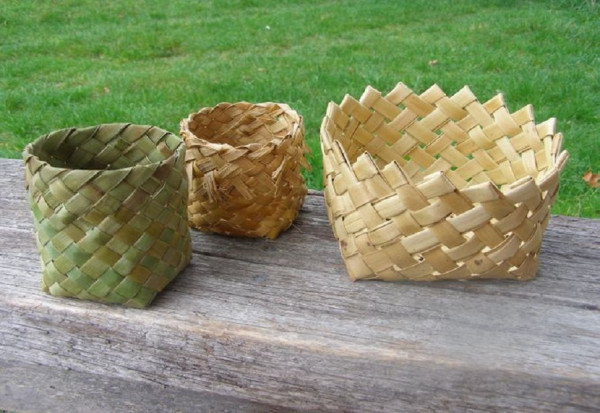
Energy!
Marfell Community School in New Plymouth became an Enviroschool in 2020 and have really impressed us with their enthusiasm and commitment to the kaupapa.
Classes have been learning about the flora and fauna in their own ‘backyard’ by examining biodiversity and pest control, as well as exploring other themes such as energy.
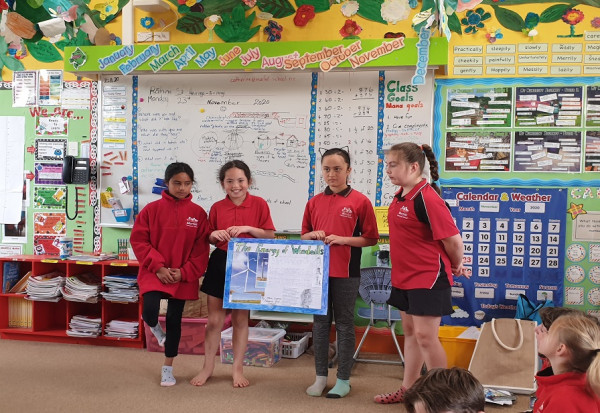
This term Room 3 students (teacher Catherine Steenson with yrs 3-5) have been exploring the Enviroschools theme area of Energy. With additional funding support, students have led a range of investigations and have written reports, invited an energy expert from Powerco(external link) to give a presentation, held workshops constructing various machines that use wind and solar energy as power sources, and explored how the theory of electricity works to make working electrical circuits.
Catherine is really keen to use this as a launching platform for further energy investigations and how renewable energy sources could be used within the kura.
Watch this space as we’re sure that the enthusiasm shown by teachers and students alike will see further amazing outcomes at Marfell.
Ōpunake Loop Trail
The Ōpunake High School and the Ōpunake Loop Trail Trust are leading players in a massive environmental restoration project encircling Ōpunake and involving scores of townsfolk of all ages.
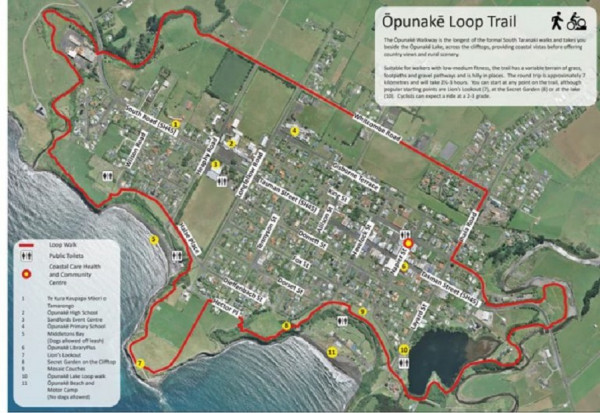
The popular walking and cycling Loop Trail has been extended into a complete circuit, with volunteers from many groups busy planting 3000 donated natives along its complete length. Their 10-year goal is 20,000 plants. Sustainability Academy High School students are building and managing predator traps along the length of the track.
The school also donated 300 hebe plants, and students have cut donated carpet into squares for weed suppression. This multi-generational project helps deepen residents’ enjoyment of the environment and promotes healthy living. It also reflects Ōpunake High School’s status as a Silver Enviroschool with a strong focus on sustainability.
The efforts from this mahi has generated more enthusiasm for continuing and increasing their nursery; an investigation into the ‘wool’ carpet squares used for weed suppression; what else the community wants along the trail and the long-term planting and maintenance of this.
Ōpunake High students are disappointed about having to return to remove the carpet squares, but are determined to, now they are aware of the fact that there is vinyl treading holding the wool together. All part of reflective learning! This amazing mahi also got them a Taranaki Regional Council Environmental Award in 2020(external link) for Education and Community efforts.
Restoring the Cloak
As part of Taranaki Enviroschools’ commitment to support the restoration of the cloak of our mounga, there have been propagation and grafting workshops, nursery development, eco-sourcing of seeds and more learning and action. Many of our Enviroschools chose to populate their spaces with kai related plants or trees and others went full force into native plantings. All schools were provided with seeds, plants &/or trees of their choice and 5 schools (Ngaere, Stratford High, Stratford Primary, Toko and Waitara High) received funding grants to help with their planting efforts.
Some of our Enviroschools chose their local awa to clear, test and plant along with long-term plans of weed releasing (chop and drop or just pull and drop) and monitoring. Others have been working on dune restorations.
Green-Gold Enviroschool, Moturoa, decided to look at the many ways in which te mounga effects all things in the ocean. This has seen them work on saving a species close to home – the Maui dolphin. Their ethos is ‘if you want to save the dolphins, then you need to go right back to the source of the problem’. What they mean is that they are working on working all the way back from the stream that opens to the ocean near them, tracing it back to the top of the mountain and encouraging landowners, community, schools and others to clear the awa all the way down – a big ask and a truly holistic way of looking at it. Good luck Moturoa! We tautoko you!
As part of this mahi, Enviroschools staff are working closely with the Central Taranaki Kahui Ako on plans around developing Vision Maps with a Permaculture Lens. Midhirst School are leading the charge on this with their systems thinking involving the Whakahurangi Marae, their school and the grounds next to the school.
A number of other Enviroschools are supporting their community from their school gardens and Waitara High School is looking at growing Watercress long term on top of feeding themselves through their onsite canteen.
Reflection – Pūmahara
This has been an effective year of learning and action with many projects having been supported through funding and engagement of school communities. The focus and support for Enviroschools within Taranaki for 2021 will help consolidate these projects and encourage those who are ready to deepen their understanding and strengthen connections with place and people.
Concepts such as food security, resilience, intergenerational learning, connection to people and place, sustainable enterprise, consumption choices and healthy ecosystems are all a possibility!